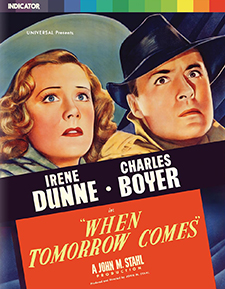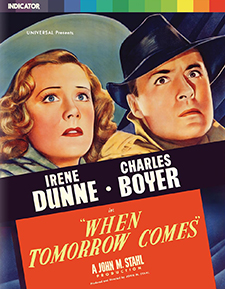When Tomorrow Comes (Region B) (Blu-ray Review)

Director
John M. StahlRelease Date(s)
1939 (September 23, 2024)Studio(s)
Universal Pictures (Indicator/Powerhouse Films)- Film/Program Grade: B
- Video Grade: A-
- Audio Grade: A-
- Extras Grade: A
Review
[Editor’s Note: This is a Region B-locked British Blu-ray import.]
Quickly made to cash in on the big critical and commercial success of Love Affair, When Tomorrow Comes reteamed Irene Dunne and Charles Boyer in a like-minded romantic melodrama. (Love Affair was released in April 1939; When Tomorrow Comes in early-August.) Unfortunately, the film exhibits many signs of having been written in great haste, though it has many good points also.
The herky-jerky screenplay stars out like a Depression-era Warner Bros. movie about working class Manhattan waitresses debating whether or not they should go on strike. Helen (Dunne) makes an impassioned, impromptu speech at a big union rally, which impresses her union organizer boyfriend, Jim Holden (Onslow Stevens). However, in an early scene, she also meets exotic French customer Philip Chagal (Boyer), and Jim vanishes from the picture entirely, never to be seen again. Helen, meanwhile, is never again seen working as a waitress or joining the picket lines, and the result of the ensuing strike is only fleetingly mentioned near the end.
(In the meet-cute scene, Philip attempts to order a pie served with cheese but minus the pie, which the waitstaff refuse to do a la Five Easy Pieces. One sign this is a romantic fantasy is the notion that a Frenchman would want “American cheese” in the first place.)
Instead, Helen is wooed by Philip at his Long Island mansion in a typically ‘30s romantic melodrama manner, he turning out to be a celebrated classical pianist who impresses Helen with his virtuoso talent. A storm brewing outside, he invites Helen to spend the night (wink-wink) but she demurs, gently insisting she be driven home. But the storm has turned into a violent hurricane—No one saw it coming?—its rising waters threatening all of Long Island. When a huge tree falls on the hood of Philip’s car, the would-be lovers seek refuge in a nearby church, eventually fleeing to the second-floor organ balcony when the water rises even further. Philip wants to confess something to Helen—the movie audience has already figured out that he’s married—but Helen insists he wait until morning to tell him, so they can share one last night of (unconsummated) bliss.
The hurricane scenes are visually quite impressive, with extensive miniature work and a flooded church, and later scenes at an evacuation center likewise impress. (Spoilers) It’s there Philip’s wife, Madeleine (Barbara O’Neill) turns up, she a helpless, unstable mental case since the stillbirth of their son five years before.
(More spoilers) When Tomorrow Comes features an excellent, naturalistic and heartfelt performance by Irene Dunne, a very good one by O’Neill, and an adequate-to-the-material one by Boyer, but the screenplay is a soupy mess. On one hand, Philip is almost saintly in his kind and gentle manner toward Helen, but he’s also eager to cheat on his wife and even effectively abandon her; only Helen’s wistful refusal to agree to such an arrangement prevents this. Philip and the screenplay assume that Madeleine’s mental illness is untreatable and incurable, which might not be too far off the unenlightened regard of illnesses like Madeleine’s then, but might have seemed a bit too conveniently hopeless even to 1939 audiences.
(Yet More Spoilers) The climax sure seems to be setting up a pat ending, hinting that Madeleine might at any moment jump out a high-rise window, making way for True Love, but instead the writers opts for an unexpected ending that, while almost unique for a 1930s Hollywood movie, is a total cop-out: meeting one last time at a restaurant, Philip’s taxi has arrived, but rather than a final goodbye, Helen prefers to think Philip is merely stepping away momentarily, and that he’ll “be right back.” And it’s there the movie ends, seemingly along with their relationship, but also with just enough ambiguity to suggest that, for the weeping women in the theaters in 1939, if Helen and Philip are lucky, Madeleine will eventually commit suicide so that the two lovers will reunite. Of course, that doesn’t consider the possibility that Madeleine might fully recover. Then what?
The movie’s unintentionally cruel and even dismissive attitude toward Madeleine’s depression (“Well, she’s nuts and that’s that!”) likewise has strange attitudes about class issues. On one hand, rich and famous Philip falls in love with a working class nobody, yet despite her pivotal role in affecting the strike, whisks her away from that obligation for his own selfish (and amorous) needs. Helen, for her part, uncomfortably covets the contents of Philip’s mansion (“You have a lot of nice things,” she says admiringly more than once), apparently a carryover from James M. Cain’s original story, in which the character was much more upwardly-mobile. Later, at the evacuation center, Philip is reunited with his French butler (Fritz Feld), whom Philip and Helen effectively abandoned at the mansion, the water quickly rising around with both phone and electricity cut off. Yet it’s the butler who’s so relieved his master his safe. Philip doesn’t reciprocate for the “help,” questioning his true intentions with Helen.
When Tomorrow Comes was previously released in the U.S. by Kino in 2022, and this seems derived from the same video master. Indicator lists theirs as a “2K restoration” of the black-and-white, 1.37:1 standard frame film, which mostly looks fine, not exceptional, with a reel or two less pristine than others. The mono audio, English only, is supported by optional English subtitles. Region “B” locked.
The extra features are worthwhile and plentiful. They consist of the following: a new audio commentary with academic and curator Eloise Ross; a video essay by Geoff Andrew on the film, placing it within the career of director John M. Stahl; The Mark of Cain, a new video essay comparing When Tomorrow Comes to Douglas Sirk’s 1957 adaptation of the same James M. Cain short story; an image gallery and a continuity script, the latter strangely included as that’s basically a transcript of the film, rather than an early draft, which would be more interesting.
The Digital Bits was, alas, sent only a check-disc. Not included in the material was a booklet that reportedly includes a new essay by Pamela Hutchinson, an archival interview with John M Stahl, a look at author James M Cain’s reaction to the film, archival pieces in which actors Irene Dunne and Charles Boyer each profile their co-star, an overview of contemporary critical responses, and film credits.
When Tomorrow Comes isn’t bad, but neither is it memorable. Quickly thrown together to cash in on the success of Love Affair, it has script problems that even Irene Dunne’s fine performance can’t overcome.
- Stuart Galbraith IV

